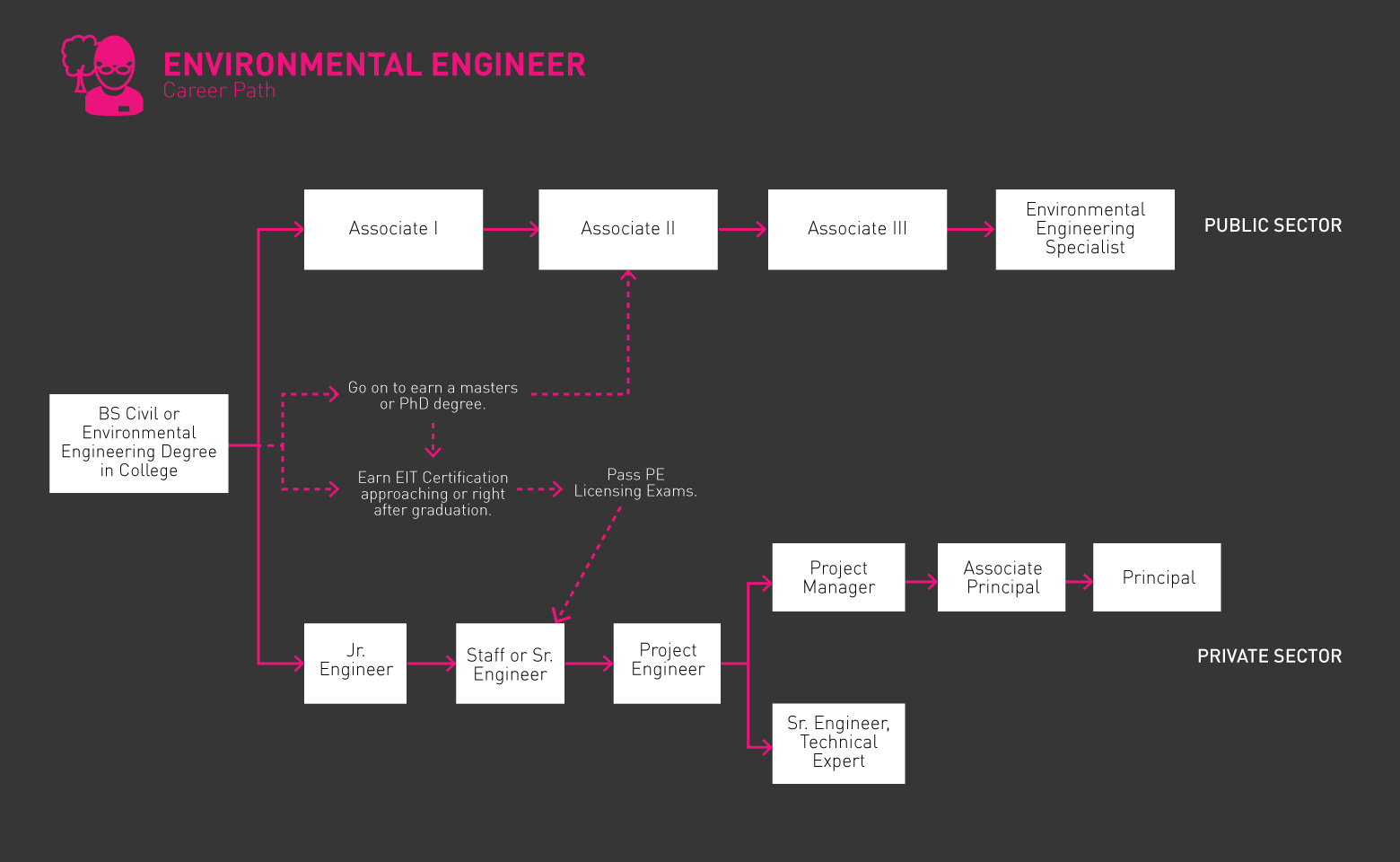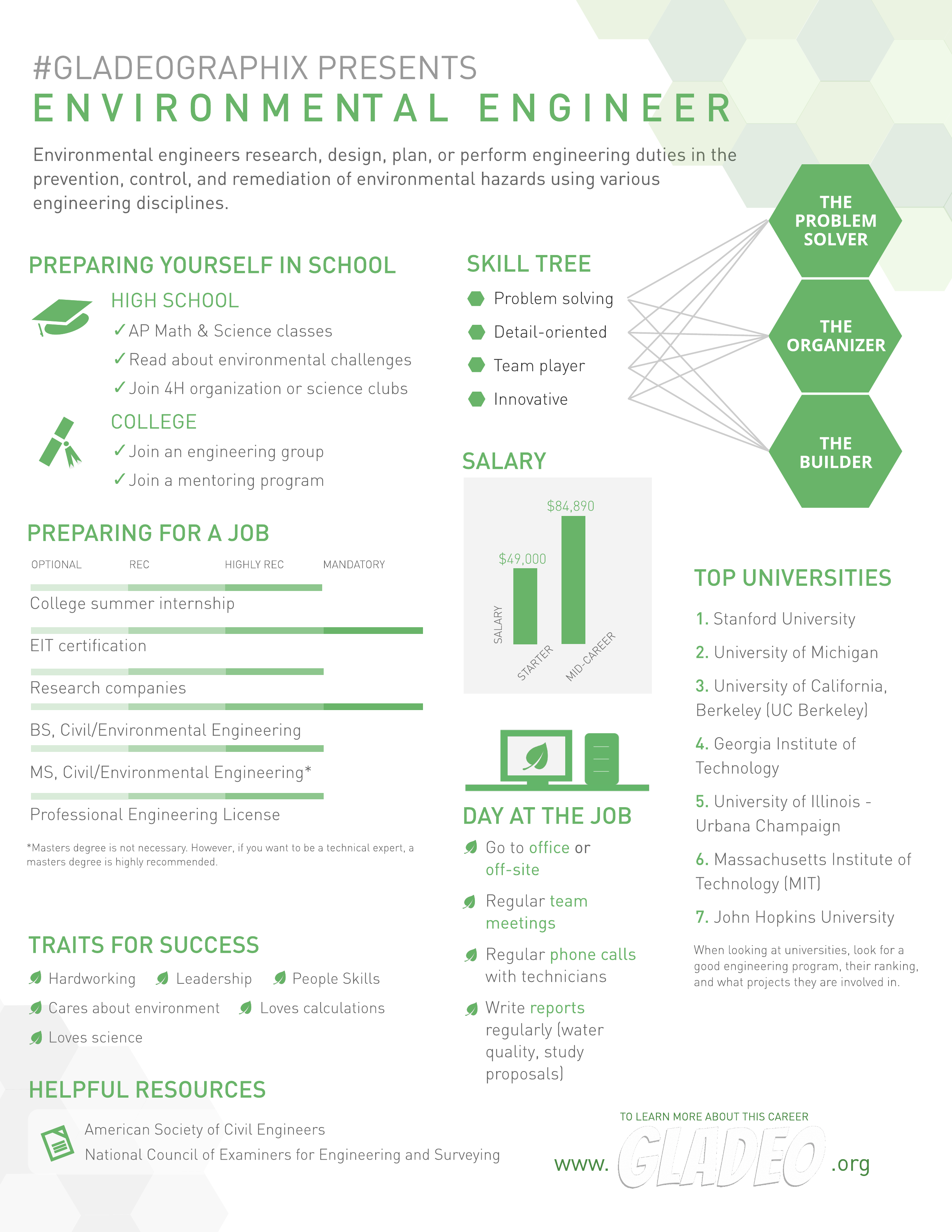Focos
Ingeniero de control de la contaminación atmosférica, ingeniero, consultor de ingeniería, especialista en remediación ambiental, ingeniero de sustancias peligrosas, ingeniero sanitario, ingeniero de campo, especialista en medio ambiente, ecologista.
Los ingenieros medioambientales investigan, diseñan, planifican o realizan tareas de ingeniería en la prevención, el control y la remediación de riesgos medioambientales (agua, suelo y aire) utilizando diversas disciplinas de la ingeniería. Su trabajo puede incluir el tratamiento de residuos, la remediación de emplazamientos o la tecnología de control de la contaminación.
- Satisfacción laboral: marcar la diferencia en el mundo y en la comunidad.
- Salario: Un buen sueldo estable.
- Desafío intelectual: Constantemente desafías a tu cerebro y piensas en formas de resolver problemas.
- Estabilidad laboral: Siempre habrá demanda de ingenieros medioambientales.
- El horario es predecible la mayor parte del tiempo: o bien se va a la oficina o bien se sale de ella, pero está programado y planificado.
- Habilidades ocasionales para el diagnóstico y la resolución de problemas: En ocasiones, se reciben llamadas telefónicas de técnicos que trabajan sobre el terreno y descubren que algo está averiado o necesita ser sustituido. Hay que pensar rápidamente qué puede ser y solucionar el problema por teléfono.
- Reuniones periódicas con el equipo: otros ingenieros, geólogos y gestores de programas para ponerse al día sobre las novedades del proyecto.
- Hablar regularmente por teléfono con los técnicos de campo, que son las personas que realizan el trabajo sobre el terreno.
- Mucho trabajo de redacción de informes: recopilar datos de los técnicos, analizarlos y redactar varios informes que comuniquen a la agencia el estado de los proyectos.
- Tipos de informes: Resultados de un estudio, informe continuo sobre la calidad del agua, propuesta para realizar un tipo diferente de estudio.
- Acuda al lugar para realizar tareas de reparación cada cierto tiempo.
- Habilidades para resolver problemas
- Orientado a los detalles
- Capacidad para trabajar en equipo: Trabajará con diferentes personas en diferentes disciplinas.
- Innovador: Debe buscar las mejores prácticas futuras.
- No te harás millonario de la noche a la mañana: el salario es competitivo, pero no ganarás una gran suma de dinero de golpe.
- ¡Me duele la cabeza!: Siempre estás usando tu cerebro para tu trabajo, así que tienes que estar activo todo el tiempo.
- Riesgos físicos potenciales: Riesgo de exposición a los elementos que se están limpiando. Sin embargo, se imparte una rigurosa formación en materia de seguridad para trabajar de forma segura.
- PRIVADO: consultoría de ingeniería para empresas (petróleo, gas, energía).
- PÚBLICO: organismos gubernamentales que aplican y regulan las políticas y el cumplimiento normativo.
- Menos trabajo en petróleo y gas.
- Más trabajo en erosión, contaminación atmosférica, aguas pluviales y vertederos de residuos peligrosos.
- El tratamiento de las aguas residuales se está convirtiendo en una preocupación cada vez mayor en aquellas zonas del país donde los nuevos métodos de perforación para la extracción de gas de esquisto requieren el uso y la eliminación de grandes volúmenes de agua.
- Me gustaba desmontar cosas, entender cómo funcionaban y volver a montarlas.
- Me gustaban los programas de Animal Planet, Discovery Channel y Science Network.
- Preocupado por el medio ambiente.
- Le gustaba estar al aire libre e interactuar con el entorno.
- Los ingenieros medioambientales suelen necesitar una licenciatura en ingeniería (normalmente ingeniería civil o química) de un programa de ingeniería acreditado por la ABET, así como experiencia laboral relacionada con experiencias cooperativas o prácticas.
- Según O*Net, el 64 % de los trabajadores de este campo tienen una licenciatura, el 27 % un máster y el 9 % un certificado de posgrado.
- No es necesario tener un máster, pero puede ayudarte a optar a puestos más avanzados y salarios más altos.
- Los trabajadores principiantes no necesitan una licencia, pero muchos optan por completar un programa de licenciatura en Ingeniería Profesional (PE) para poder convertirse en ingenieros profesionales con licencia capaces de «supervisar el trabajo de otros ingenieros, aprobar proyectos y prestar servicios directamente al público».
- Cada estado tiene diferentes requisitos para obtener la licencia. Es posible que los candidatos deban primero rendir un examen de Fundamentos de Ingeniería (FE), convertirse en Ingenieros en Formación o Ingenieros Pasantes, y luego rendir el examen de Principios y Práctica de Ingeniería (PE).
- Las certificaciones adicionales pueden reforzar tus credenciales. Entre ellas se incluyen:
- Academia de Profesionales Ambientales Certificados por la Junta -
- Profesional medioambiental certificado en formación
- Profesional certificado en medio ambiente
- Ingeniero medioambiental certificado por la junta - Gestión de residuos peligrosos
- Ingeniero medioambiental certificado por la junta - Protección radiológica
- Ingeniero medioambiental certificado por la junta - Gestión de residuos sólidos
- Academia Americana de Gestión de Proyectos - Ingeniero de Planificación Certificado
- Sociedad Americana de Ingenieros de Calefacción, Refrigeración y Aire Acondicionado -
- Diseño de edificios de alto rendimiento
- Operador de instalaciones de residuos municipales
- Asociación de Ingenieros Energéticos -
- Auditor energético certificado
- Rendimiento energético superior
- Profesional certificado en desarrollo sostenible
- Gestor energético certificado
- Profesional certificado en adquisición de energía
- Junta para la Certificación Global en EHS - Profesional Ambiental Cualificado
- Green Business Certification Inc. -
- LEED AP Desarrollo de barrios
- Hogares LEED AP
- LEED AP Diseño y construcción de edificios
- Instituto de Gestión de Materiales Peligrosos - Profesional certificado en mercancías peligrosas
- Junta Internacional para la Certificación de Gestores de Seguridad - Gestor Certificado en Control de Riesgos
- Registro Nacional de Profesionales del Medio Ambiente -
- Profesional certificado en gestión de residuos
- Profesional medioambiental registrado
- Asesor registrado en evaluación de propiedades medioambientales
- Asociación de Residuos Sólidos de América del Norte -
- Gestión de sistemas integrados de gestión de residuos sólidos
- Gestión de materiales de construcción y demolición
- Gestión de sistemas de reciclaje
- Organización Mundial de Seguridad -
- Especialista certificado en seguridad gubernamental
- Técnico certificado en seguridad gubernamental
- Funcionario medioambiental certificado por el gobierno
- Academia de Profesionales Ambientales Certificados por la Junta -
- Se paga más si se obtiene una licencia PE.
- Se paga más si se va a una universidad de cuatro años.
- Recomiendo encarecidamente una carrera universitaria de cuatro años, y luego solo hay que trabajar dos años para obtener la licencia (PE).
- Si no vas a una universidad de cuatro años, aún puedes obtener la licencia, pero debes trabajar como ingeniero ambiental durante siete años antes de obtener tu licencia de ingeniero profesional (PE).
- Buen programa de ingeniería
- Escuela acreditada, clasificada.
- La escuela valora los programas de ingeniería: ¿Realizan buenas investigaciones? ¿Quiénes son sus antiguos alumnos? ¿Tienen buenos profesores?
- ¿Qué hace el profesorado? ¿Participan en proyectos, en trabajos desafiantes en el campo? ¿Te interesa su trabajo? ¿Hay profesionales que imparten clases como invitados?
- Apúntate a cursos de álgebra, cálculo, ecuaciones diferenciales, química, física, biología, ingeniería, inglés y geología.
- Adquiere experiencia laboral práctica a través de prácticas como ingeniero medioambiental.
- Ofrecerse como voluntario para actividades escolares en las que se puedan practicar habilidades de trabajo en equipo y colaboración.
- Aprenda a utilizar software como DHI Water and Environment.
- Otros programas de software aplicables con los que conviene familiarizarse son:
- Software de cumplimiento normativo
- Diseño asistido por ordenador
- Interfaz de usuario y consulta de la base de datos
- Comunicaciones de escritorio
- Entorno de desarrollo
- Sistemas de información geográfica
- Programas de control industrial
- Herramientas para la creación de mapas
- Conocimientos de programación en Python y R
- Lee artículos y mira tutoriales sobre ingeniería ambiental para aprender de los expertos.
- Intenta concertar una entrevista informativa con un ingeniero medioambiental para hacerle preguntas.
- ¡Decida qué tipo de trabajo desea dentro de este campo! Hay diferentes opciones profesionales, como operadores de plantas de tratamiento de agua, especialistas en cumplimiento normativo, profesores universitarios, topógrafos, planificadores de transporte, científicos medioambientales, especialistas en recursos naturales, consultores, ingenieros geotécnicos, diseñadores civiles y mucho más.
- Únete a organizaciones profesionales para aprender, crecer y establecer contactos (consulta nuestros Recursos recomendados > Sitios web para ver una lista de opciones).
- 3,5 % con título de secundaria
- 4 % con título de asociado
- 49,2 % con título universitario
- 34,4 % con máster
- 4,7 % con doctorado

- Consigue unas prácticas universitarias de verano.
- Aprueba el examen EIT (Ingeniería en Formación) y obtén la certificación.
- Investiga diferentes empresas, encuentra lo que te interesa y averigua en qué tipo de empresa te gustaría trabajar.
- Las agencias de empleo también pueden ayudarte a encontrar trabajo.
- ¡Conéctate!
- BLS prevé que las oportunidades laborales se mantendrán bastante estables, ya que «la preocupación de los gobiernos estatales y locales por el agua está dando lugar a iniciativas para aumentar la eficiencia en el uso del agua» y el gobierno federal trabaja para limpiar los sitios contaminados.
- Las prácticas de ingeniería medioambiental y los programas cooperativos de ingeniería son dos excelentes formas de empezar.
- Regístrese para recibir alertas en portales de empleo como Indeed, Simply Hired, Glassdoor y Zippia.
- También hay varias bolsas de trabajo específicas para ingenieros, como la Sociedad Nacional de Ingenieros Profesionales, EngineeringJobs.net, IEEE Job Site, la Sociedad de Mujeres Ingenieras, ASCE Career Connections, la Sociedad de Ingenieros Profesionales Hispanos, el Consejo Americano de Empresas de Ingeniería, C&ENjobs, ASHRAE Jobs y Tau Beta Pi, la Sociedad de Honor de Ingeniería.
- ¡Trasládate allí donde hay trabajo! Los estados con mayor nivel de empleo para los ingenieros medioambientales son California, Nueva York, Texas, Colorado y Pensilvania. Los estados con mayor concentración de puestos de trabajo son Alaska, Virginia Occidental, Colorado, Montana y Wyoming.
- Habla con el centro de orientación profesional de tu escuela para obtener ayuda con los currículos, simulacros de entrevistas e información sobre ferias de empleo.
- Pide a tus profesores, supervisores y compañeros de trabajo que den referencias personales sobre ti.
- Revisa las plantillas de currículum de ingeniero medioambiental para obtener ideas sobre la redacción y los formatos.
- Estudia las preguntas de la entrevista para ingeniero medioambiental para prepararte para las entrevistas.
- Únete a asociaciones: Sociedad Americana de Ingenieros Civiles
- Únete a la sección local: te ayuda a establecer contactos, charlas mensuales sobre el sector, seminarios, excursiones.
- Voluntariado: Ingenieros sin Fronteras permite a los ingenieros trabajar en proyectos en los que no necesariamente trabajarían (mejor cartera de trabajos, experiencia diversa).
- El conocimiento es poder: asista a seminarios, webinarios y talleres para asegurarse de estar al día de las últimas tecnologías y novedades del sector.
- Sé curioso: ¿Quién lidera actualmente la tecnología en el sector? ¿Qué tecnologías emergentes hay en el sector?
- Trabajador: hace más de lo que se espera, más de 40 horas.
- Liderazgo: Ven con un propósito y un plan.
- Habilidades sociales: Establezca contactos y conozca a personas de su sector, asista a eventos.
- Se adapta bien al trabajo en equipo con personas difíciles y diferentes.
- Se preocupa por el medio ambiente.
- Le encantan los cálculos.
- Le encantan las complejidades y la ciencia de las cosas.
- Le encantan los retos y resolver problemas.
Sitios web
- Academia de Profesionales Ambientales Certificados por la Junta
- Junta de Acreditación de Ingeniería y Tecnología
- Asociación de Gestión del Aire y los Residuos
- Alianza de Profesionales de Materiales Peligrosos
- Academia Americana de Ingenieros y Científicos Ambientales
- Asociación Americana de Higiene Industrial
- Instituto Americano de Ingenieros Químicos
- Asociación Americana de Obras Públicas
- Sociedad Americana para la Educación en Ingeniería
- Sociedad Americana de Ingenieros Civiles
- Sociedad Americana de Ingenieros de Calefacción, Refrigeración y Aire Acondicionado
- Sociedad Americana de Ingenieros de Seguridad
- Asociación de Ingenieros Energéticos
- Junta para la Certificación Global en EHS
- Certificación de Empresas Ecológicas S.A.
- Instituto de Gestión de Materiales Peligrosos
- Junta Internacional para la Certificación de Gestores de Seguridad
- Registro Nacional de Profesionales del Medio Ambiente
- Asociación de Residuos Sólidos de América del Norte
- Organización Mundial de Seguridad
Libros
- Ingeniería medioambiental: Fundamentos, sostenibilidad, diseño, por James R. Mihelcic y Julie B. Zimmerman.
- Introducción a la ingeniería medioambiental, por Mackenzie Davis y David Cornwell
- Introducción a las infraestructuras: Introducción a la ingeniería civil y medioambiental, por Michael R. Penn y Philip J. Parker.
Carreras alternativas: derecho ambiental, políticas públicas, trabajo regulatorio.
Fuente de noticias

Empleos destacados

Cursos y herramientas en línea

Expectativas salariales anuales
Los nuevos trabajadores comienzan con un salario de alrededor de 104 000 dólares. El salario medio es de 113 000 dólares al año. Los trabajadores con mucha experiencia pueden ganar alrededor de 141 000 dólares.
Expectativas salariales anuales
Los nuevos trabajadores comienzan con un salario de alrededor de 84 000 dólares. El salario medio es de 104 000 dólares al año. Los trabajadores con mucha experiencia pueden ganar alrededor de 128 000 dólares.
Expectativas salariales anuales
Los nuevos trabajadores comienzan con un salario de alrededor de 105 000 dólares. El salario medio es de 128 000 dólares al año. Los trabajadores con mucha experiencia pueden ganar alrededor de 150 000 dólares.
Expectativas salariales anuales
Los nuevos trabajadores comienzan con un salario de alrededor de 88 000 dólares. El salario medio es de 102 000 dólares al año. Los trabajadores con mucha experiencia pueden ganar alrededor de 128 000 dólares.








